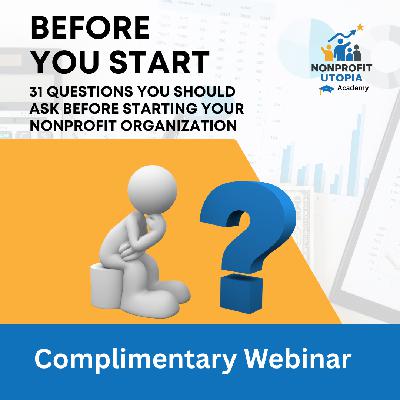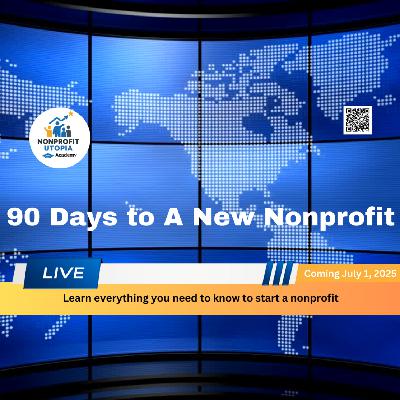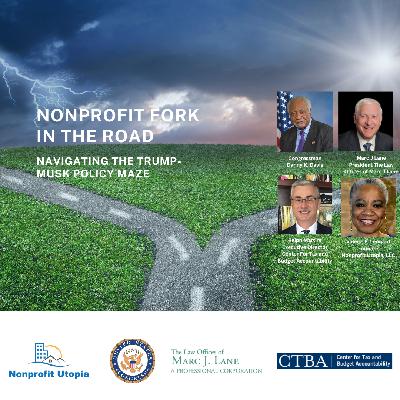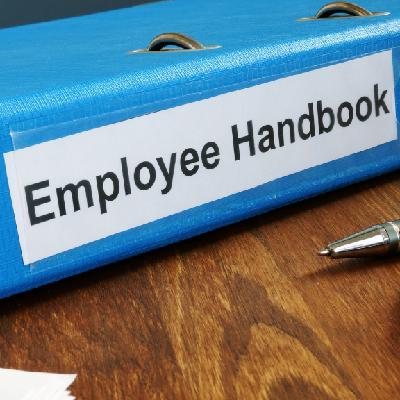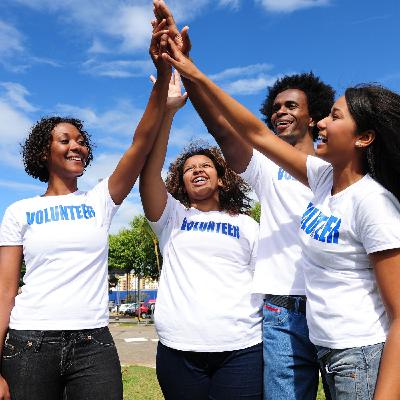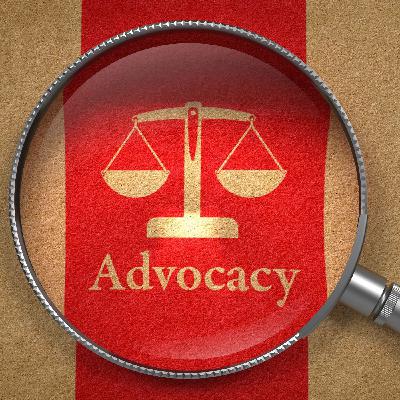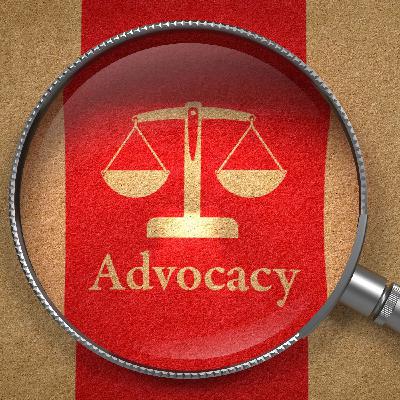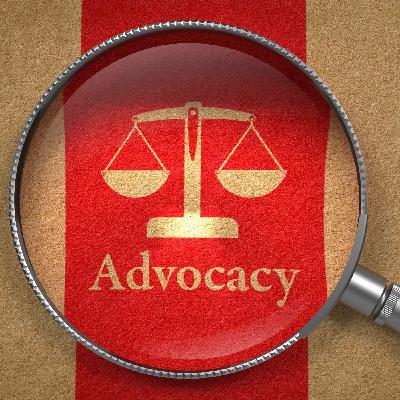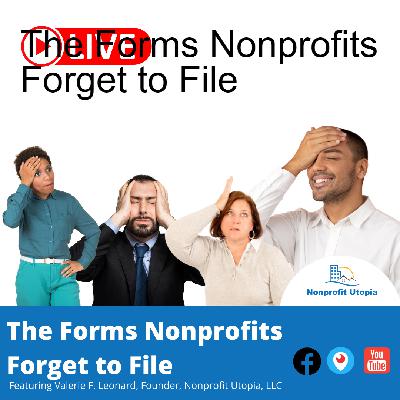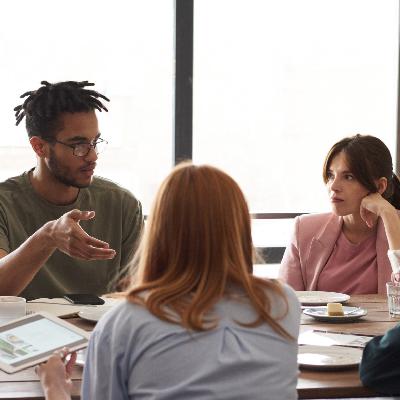Discover Nonprofit Utopia Podcast
Nonprofit Utopia Podcast

Nonprofit Utopia Podcast
Author: Nonprofit Utopia
Subscribed: 105Played: 419Subscribe
Share
© Copyright Valerie F. Leonard (C/O Blogtalkradio)
Description
Formerly known as Nonprofit ”U”, the Nonprofit Utopia podcast is an extension of the ideal community for emerging nonprofit leaders. We use our podcast as an online forum where nonprofit stakeholders can discuss the latest developments in the sector and increase their capacity to serve their clients and build sustainable communities. Valerie F. Leonard, an expert in community and organizational development is the host. Topics include nonprofit management, community development, capacity building and organizational development.
122 Episodes
Reverse
Starting a nonprofit organization will require your team's attention to detail, and your ability to fund its mission and meet community needs while adapting to change. It can take nonprofit leaders years to get their organizations off the ground because they don't know where to start, or where to go to get help to keep the organization going. We created this webinar to help you cut to the chase and to decide whether or not to start a new nonprofit. We have also included a complimentary workbook to help you follow along during the webinar and to begin to think through critical issues. Answering these guiding questions will help you save time, money and effort. Whether you decide to start a new organization, put your ideas on hold, or even abandon the idea of starting a nonprofit, you will find that the time you spend answering these questions will be well-spent. -Clarify who you want to serve and why -Identify service gaps in your community -Uncover potential partnerships -Outline your unique approach to solving problems -Determine whether now is the right time to launch Download the workbook here: https://nonprofit-utopia.lpages.co/qu...
Coming July 1, 2025: 90 Days to A New Nonprofit™ – A Clear Path from Idea to Impact You’ve got a vision for change—a nonprofit idea that keeps you up at night because you know the world needs it. But like so many others, you may find yourself stuck before you even start. The legal hurdles, the paperwork, the pressure to “get it right”—it all feels overwhelming.
Join us as we unpack a powerful new resource designed to change that. 90 Days to A New Nonprofit™ is a structured, founder-centered course launching July 1, 2025. It walks you through the entire process of launching a nonprofit—from validating your idea to filing your paperwork, building your board, defining your mission, and laying the foundation for long-term success. This isn’t just theory. It’s a step-by-step framework developed by nonprofit veteran Valerie F. Leonard, whose two decades of experience have helped nearly a thousand founders raise over $100 million.
The LEGACY™ Framework at the heart of this course is built on what actually works in the real world, with tools and guidance that simplify complex processes. In the video, we explore what makes this program so unique—from its weekly structure and practical templates to the support systems that keep you moving forward with confidence. Whether you're new to the sector or finally ready to stop spinning your wheels, this might be the clear starting point you've been waiting for.
If you’ve felt overwhelmed, uncertain, or just unsure of how to move forward with your nonprofit dream, this is your invitation to take that first confident step. We will be launching on July 1, 2025, with the first class starting July 18th. Learn more and get on the waitlist:https://bit.ly/4kyxIJF
The Department of Government Efficiency (DOGE) has had far-reaching consequences for the nonprofit sector, as many organizations rely on federal funding, regulatory stability, and government partnerships to fulfill their missions. With mass layoffs, budget cuts, and policy shifts under DOGE, nonprofits are facing significant challenges. Join us for an enlightening conversation on the impact of DOGE on nonprofits, and how they can pivot for success in this current environment.
Did you know that tax-exempt organizations are 2 times more likely than tax payers to be late with filing annual returns with the IRS? According to the IRS, there are about 2.95 million registered nonprofit organizations in the United States. Of this number, 1.065 million registered organizations, or 36%, lost their tax exempt status because they didn’t file Form 990 for three years in a row. While the remaining 1.88 million registered organizations are still eligible to receive tax-exempt contributions there is a strong likelihood that they still may have compliance issues. In comparison, about 85% of individual and corporate taxpayers file their income taxes (Form 1040) on time. Filing annual 990’s with the IRS is only one piece of the compliance puzzle. You also have to follow your organization’s own policies and procedures, and funders’ grant agreements. On top of that, you should be concerned with following federal and local regulations and maintaining transparency with the public. The consequences of noncompliance include strained relationships with funders and regulators; loss of funding; loss of standing with your clients and community; difficulty attracting funding; loss of tax-exempt status; tax liabilities and paying penalties and interest. I have found in my experience that all roads lead to compliance. It doesn’t matter what the assignment involves—program development, strategic planning, board development—or what have you. At one time or another we are all confronted with compliance issues and challenges. I will share a checklist of the filings that Illinois nonprofits need to maintain compliance. Be sure to check with your own state’s requirements and consult an attorney if needed..
Let us help you bring your filings current. https://nonprofit-utopia.teachable.co...
Check out our blog post here https://nonprofitutopia.com/just-chec...
Download a complimentary copy of "31 Questions You Need to Answer Before Starting A Nonprofit https://nonprofit-utopia.lpages.co/qu...
Download a complimentary copy of "Nonprofit Resource Mapping On Steroids" https://nonprofit-utopia.lpages.co/no...
Want to create live streams like this? Check out StreamYard: https://streamyard.com/pal/d/64324963...
Often called the personality of an organization, organizational culture is a shared set of workplace beliefs, values, attitudes, standards, purposes, and behaviors. It reflects both the written and unwritten rules that people in an organization follow. Your organization’s culture is the sum of all that you and your colleagues think, say, and do as you work together. If that sounds important, it is. (Bamboo HR)
For our purposes, when we speak of toxic nonprofit cultures, we are speaking of environments that stifle creativity and productivity, and prevents organizations from making the maximum impact on clients and the communities they serve. We will talk about 12 signs that your nonprofit's culture is toxic, and strategies you can use to make improvements.
The nonprofit employee handbook can be used to support operations, communicate benefits and other employment retention policies and minimize risks that might arise from lawsuits and failure to comply with state and federal regulators. We will show you how to develop an employee handbook, what should go into it, and refer you to professionals who can review your finished product. If you are a member of the Nonprofit Utopia community, we will share templates and free and low-cost resources you can use to develop employee handbooks that create winning situations for your organization's board and staff.
Sankofa is a word in the Twi language of Ghana meaning “to retrieve" More commonly, it symbolizes taking from the past what is good and bringing it into the present in order to make positive progress through the benevolent use of knowledge. Sankofa is often symbolized by a mythical bird with its head turned backwards while its feet face forward carrying a precious egg in its mouth.
As we finish out the year in the Nonprofit Utopia community, we are taking stock of our wins, our losses and challenges in 2022 so that we can finish the year strong, and hit the ground running in 2023. One of our first steps is to use assessment tools to gauge our leadership styles and skills and organizational skills in order to get a true sense for where we are. Indeed, we believe that we can’t really know where we should be going until we know where we are and where we have been. Even if it means peeking through our fingers because the truth is so glaring that we could be startled into paralysis.
This podcast will help you understand
1. The power of assessments
2. How to use assessments to chart your professional course
3. How to use assessments to help your organization navigate community change
Nonprofit Utopia community members will also have access to individual and organizational assessments and a members-only group coaching session to get answers to questions and draw from support of their peers.
I have worked with a number of nonprofit leaders who live by the adage, "If you fail to plan, then you plan to fail." Often, when it comes to volunteer management, they don't pay quite as close attention. After all, volunteers are not salaried employees, and they are often brought on for ad hoc projects. The tendency is to give higher priority to processes that have greater budget impact. However, leaving volunteer management up to chance is doing your organization and volunteers a great disservice. The organization misses out on opportunities to leverage volunteers to grow capacity. At the same time, volunteers who are looking at volunteerism as a way to develop professionally are left feeling unfulfilled. Careful planning is necessary to create win-win situations for your organization and volunteers.
This session will show you how to assess your organization's readiness for volunteers, develop a volunteer management plan and develop policies and procedures. Nonprofit Utopia members will be able to download sample documents from the online community.
SHOW LESS
According to Lawrence Wallack, a prominent health researcher, "media advocacy is rooted in community advocacy and has as its goal the promotion of healthy public policies. It can be differentiated from traditional mass media strategies in a number of ways. Media advocacy shifts the focus from the personal to the social, from the individual to the political, from the behavior or practice to the policy or environment. While traditional media approaches try to fill the 'knowledge gap,' media advocacy addresses the 'power gap'."
Join us for a lively discussion with Sarah Karp, a reporter with WBEZ in Chicago. We will talk about ways you can engage the media to bring about systems change in your own communities. You will learn
1. What makes a story concerning systems change newsworthy 2. The differences between a news story, press release and op-ed
3. The subtle differences between working with print media versus radio and other media
3. The do's and don'ts of working with the media
4. How to ride the news cycle
Generally speaking, when we think of organizational capacity building, we think of activities like board development, strategic planning and program evaluation. One often overlooked method for improving organizational capacity is developing issue advocacy campaigns. Not only do issue advocacy campaigns help develop leadership capacity for staff and stakeholders, but they can effect systems change, creating the environment to produce positive outcomes for your clients, communities and organizations. Valerie F. Leonard, the Founder of Nonprofit Utopia, LLC, will walk you through the process of creating issue advocacy campaigns and engaging community and public officials. Nonprofit Utopia members will have access to handouts to help them implement lessons learned immediately.
Generally speaking, when we think of organizational capacity building, we think of activities like board development, strategic planning and program evaluation. One often overlooked method for improving organizational capacity is developing issue advocacy campaigns. Not only do issue advocacy campaigns help develop leadership capacity for staff and stakeholders, but they can effect systems change, creating the environment to produce positive outcomes for your clients, communities and organizations. Valerie F. Leonard, the Founder of Nonprofit Utopia, LLC, will walk you through the process of creating issue advocacy campaigns and engaging community and public officials. Nonprofit Utopia members will have access to handouts to help them implement lessons learned immediately.
All too often nonprofit leaders are so busy focusing on program development and fundraising that they often overlook policy advocacy as an effective means of capacity building. In this episode we will go over the various forms of advocacy and show you how to develop community action plans to effect systems change where you live.
FBRK Impact House is Chicago’s first dedicated work club focused on serving and supporting the philanthropic sector by providing a place where granting organizations can work together, intentionally sharing ideas and resources, to operate with greater efficiency. Home to 18 philanthropic organizations, the center is working across multiple sectors to develop innovative solutions to some of the most entrenched problems in the state of Illinois.
Join us for a lively discussion with DeJuan Kea, Co-Founder of FBRK Brands, and Revin Fellows, Co-Founder of NBAC to talk about the latest developments at FBRK House and ways real estate development may be used to facilitate comprehensive capacity building for nonprofits and small businesses.
Monique B. Jones, LCSW is the President and CEO of Forefront, Illinois’ statewide association representing both grantmakers and nonprofits, as well as their advisors and allies. She is a visionary leader with an extensive background in mental health, violence prevention, philanthropy, and gender & racial equity. Join us for a lively discussion as Monique shares lessons learned from her 100-day listening tour and ways she's preparing to lead Forefront to its next level of development.
Regardless of your position in a nonprofit organization, your job is to communicate with the public. This means talking about your programs and services, your impact to the community, upcoming events, etc. We will show you how to develop a solid communications strategy so that you can attract volunteers and funders and arm your board members and employees with strategies they need to attract more resources to the organization.
When you start your nonprofit organization, it is so easy to focus on filing forms to establish your organization, and then start on your application for tax-exempt status. There is a very strong possibility that you didn't know about the other forms you need to fill out so that your organization can start out on strong footing. You are not alone. This is very common for new organizations--and some established organizations.
You would be surprised at how many organizations there are that have been in operation for years without knowing all the forms they need to complete. Sometimes they find out the hard way--by finding out they need to pay payroll taxes or unemployment insurance premiums. In worst case scenarios, their organizations could lose tax-exempt status or be involuntarily dissolved by the state. Join us as we give you an overview of all the forms you need to complete andhttps://www.youtube.com/watch?v=_UzX5HfkRYg&t=613s when.
You can also check out the video on YouTube at
Filing for tax exemption is tedious, time-consuming, and not for the faint of heart. The process often requires applicants to “go back and forth” with the IRS for a number of reasons, including errors, clarification of statements and omission of key information. Clearly, following instructions is critical. Tune in as Valerie F. Leonard talks about some of the most common reasons the IRS rejects applications for tax exemption, and how you can avoid common mistakes.
James Mueller, President of Mueller & Associates, will be a guest on the Nonprofit Utopia Podcast to talk about his latest book, Onboarding Champions, the the essential guidebook for nonprofit board members and executives. It challenges board members to become champions of governance and provides a roadmap to get there. We will talk about seven recruiting principles of highly effective nonprofit boards, including culture, character, competence, connections, composition continuity and collaboration. James will share a wealth of information on a number of topics, including how to use a disciplined approach to building diverse and equitable boards; managing your board and leadership team remotely during the COVID-19 pandemic and how to confront board members who put their own self interests above the organization's best interests.
Tune in as Valerie F. Leonard talks about how to start and manage a nonprofit business in the State of Illinois. Topics of discussion include conducting a community needs assessment; selecting your team; developing the bylaws; incorporating your organization, filing for tax exemption and managing the organization.


